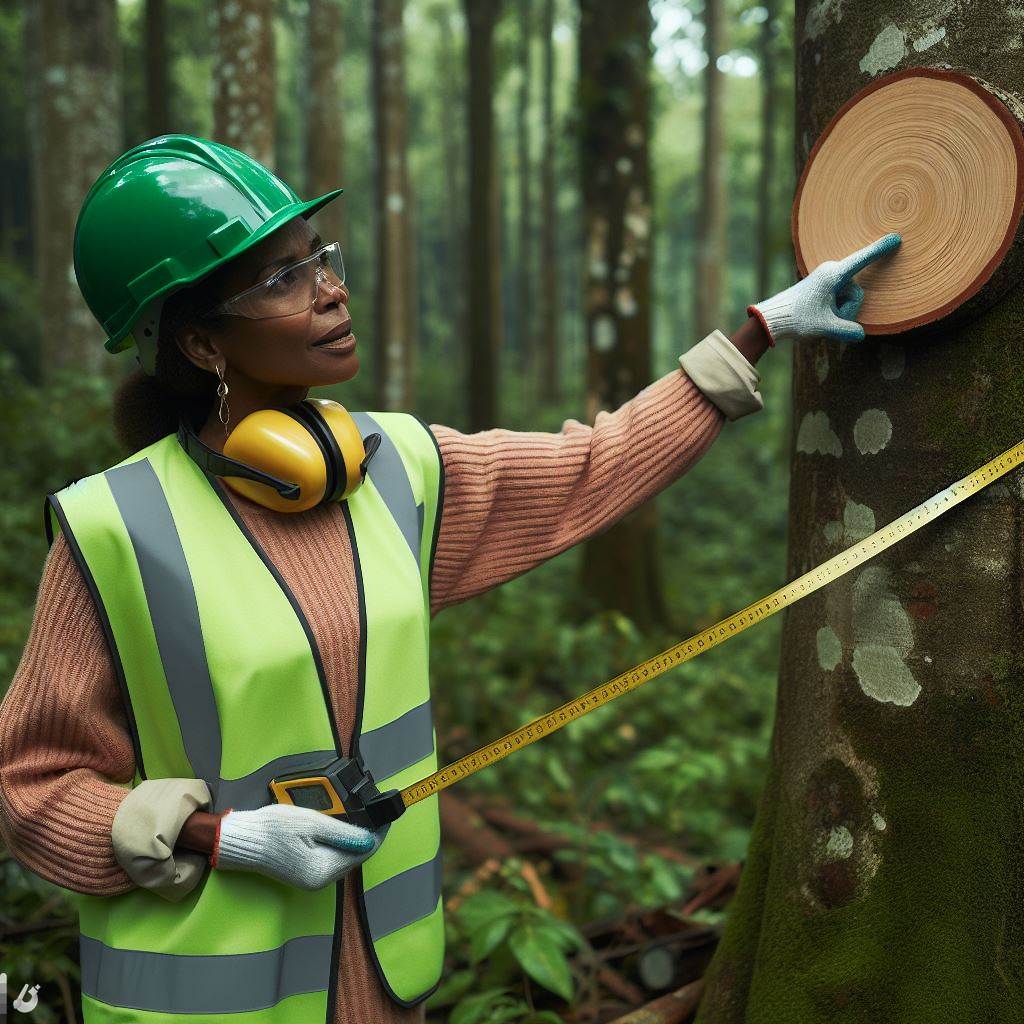Introduction
Let’s explore Env Engineering in Canada.
Environmental engineering plays a crucial role in tackling climate change and promoting sustainable development.
In Canada, the field is currently thriving and evolving to meet the country’s environmental challenges.
Importance of environmental engineering in addressing climate change and sustainable development
Environmental engineering is vital for addressing climate change and achieving sustainable development.
It encompasses various disciplines, such as waste management, water treatment, and pollution control.
Without effective environmental engineering, these issues would continue to worsen, impacting our quality of life and the health of our planet.
In Canada, environmental engineering has gained significant importance due to the country’s commitment to environmental sustainability.
With vast natural resources and a growing population, Canada faces unique environmental challenges.
The field of environmental engineering has been instrumental in developing innovative solutions to manage these challenges effectively.
Overview of the current state of environmental engineering in Canada
Currently, the practice of environmental engineering in Canada is at the forefront, fueled by advancements in technology and an increased awareness of environmental concerns.
The nation has implemented strict regulations and policies to promote sustainable practices in various sectors, calling for the expertise of environmental engineers.
The importance of environmental engineering is further emphasized by the need to protect Canada’s rich biodiversity and pristine ecosystems.
With its diverse landscapes, Canada is home to several unique species and habitats that require careful management and conservation.
Environmental engineers play a critical role in ensuring the preservation of these natural wonders.
Essentially, the future of environmental engineering in Canada is promising.
It will continue to play a key role in addressing climate change, promoting sustainable development, and protecting Canada’s invaluable natural resources.
With ongoing advancements in the field, environmental engineers in Canada will lead the way towards a greener and more sustainable future.
Growth of the Environmental Engineering Field in Canada
Environmental engineering is a rapidly growing field in Canada, with increasing demand in various sectors such as energy, transportation, and water management.
Environmental engineers play a crucial role in developing and implementing sustainable solutions to address environmental challenges.
The Canadian government has taken initiatives and implemented policies to support the growth of the environmental engineering field.
Increasing Demand for Environmental Engineers in Various Sectors
As the world focuses on sustainable development, there is a growing demand for environmental engineers in Canada.
Environmental engineers work in diverse sectors like energy, transportation, and water management, addressing environmental issues specific to each sector.
In the energy sector, environmental engineers are responsible for developing strategies to minimize the environmental impact of energy production and consumption.
They play a crucial role in implementing clean energy technologies and ensuring compliance with environmental regulations.
In the transportation sector, environmental engineers work to minimize the environmental footprint of transportation systems.
Unlock Your Career Potential
Visualize a clear path to success with our tailored Career Consulting service. Personalized insights in just 1-3 days.
Get StartedThey develop efficient and sustainable transportation networks, promoting the use of eco-friendly vehicles and reducing air and noise pollution.
Water management is another area where environmental engineers are in high demand.
They address issues related to water quality, wastewater treatment, and water resource management.
Environmental engineers design and implement systems to ensure the safe and sustainable use of water resources.
Role of Environmental Engineers in Developing and Implementing Sustainable Solutions
Environmental engineers play a vital role in developing and implementing sustainable solutions to address environmental challenges.
They work on projects that aim to reduce pollution, conserve resources, and promote environmental sustainability.
Environmental engineers conduct research, analyze data, and develop innovative techniques to solve complex environmental problems.
They collaborate with professionals from various disciplines to find holistic solutions that consider both environmental and societal factors.
Environmental engineers also play a key role in environmental impact assessments, ensuring that projects comply with environmental regulations.
They assess the potential environmental effects of proposed projects and propose mitigation measures to minimize negative impacts.
By integrating sustainability principles into engineering projects, environmental engineers contribute to a greener and more sustainable future.
Government Initiatives and Policies Supporting the Growth of the Field
The Canadian government recognizes the importance of environmental engineering in addressing environmental challenges.
It has implemented initiatives and policies that support the growth of the field and promote sustainable development.
Government funding is available for research and development projects related to environmental engineering.
These funds enable environmental engineers to conduct research, develop innovative solutions, and implement sustainable practices.
Government policies also provide guidelines and regulations to ensure that environmental considerations are integrated into engineering projects.
These policies create a supportive framework for environmental engineers to work towards sustainable solutions.
The government’s commitment towards sustainable development further boosts the growth of the environmental engineering field.
It provides opportunities for environmental engineers to contribute to the development of sustainable infrastructure and policies.
Overall, the future of environmental engineering in Canada looks promising, with increasing demand, important roles in various sectors, and supportive government initiatives and policies.
Environmental engineers have the opportunity to make a significant impact by developing and implementing sustainable solutions to address environmental challenges.
Read: Canadian Livestock Farming Insights
Challenges and Opportunities in the Future of Environmental Engineering in Canada
As the field of environmental engineering continues to evolve, Canada faces both challenges and opportunities that will shape the future of this profession.
From climate change to technological advancements, collaboration, and global recognition, environmental engineers in Canada must navigate a complex landscape to ensure a sustainable future for the country.
Climate Change and its Impact on Infrastructure and Natural Resources
One of the biggest challenges that environmental engineers in Canada face is the impact of climate change on infrastructure and natural resources.
As the earth’s temperature rises, extreme weather events such as floods and wildfires become more frequent and intense.
This puts a strain on existing infrastructure, including water treatment plants, stormwater management systems, and transportation networks.
To address these challenges, environmental engineers must develop innovative solutions that can withstand the effects of climate change.
This may involve designing more resilient infrastructure, implementing green infrastructure practices to manage stormwater, and initiating projects to improve the sustainability of natural resources.
The Need for Innovative Technologies and Approaches in Environmental Engineering
With the rapid advancement of technology, there is a growing need for environmental engineers in Canada to embrace innovative technologies and approaches.
These include the development and implementation of advanced monitoring systems, remote sensing techniques, and data analytics to collect and analyze environmental data efficiently.
Furthermore, environmental engineers must stay updated on emerging trends, such as nanotechnology and bioremediation, which offer promising solutions for environmental challenges.
By embracing these new technologies and approaches, environmental engineers can contribute to more efficient and effective solutions for environmental issues in Canada.
Collaboration with Other Scientific Disciplines and Industries for Effective Solutions
Environmental engineering is a highly interdisciplinary field that requires collaboration with other scientific disciplines and industries.
To tackle complex environmental challenges, it is crucial for environmental engineers to work hand in hand with professionals from fields such as ecology, hydrology, geology, and chemistry.
Additionally, collaboration with industries is essential to address environmental issues caused by industrial activities.
By working together with industries, environmental engineers can develop and implement sustainable practices that minimize negative environmental impacts and promote a more sustainable future.
Global Recognition and Job Opportunities for Canadian Environmental Engineers
Canada has a reputation for being at the forefront of environmental protection and sustainability.
As a result, Canadian environmental engineers enjoy global recognition for their expertise and the high standards they uphold.
This global recognition presents significant job opportunities for Canadian environmental engineers, both at home and abroad.
With their expertise in sustainable infrastructure development, water resource management, and pollution control, Canadian environmental engineers can contribute to global projects that address pressing environmental issues.
Basically, the future of environmental engineering in Canada presents both challenges and opportunities.
Climate change, innovation, collaboration, and global recognition are key factors that will shape this field.
By addressing these challenges and taking advantage of the opportunities, environmental engineers can ensure a sustainable future for Canada and contribute to global environmental efforts.
Read: Conservation Science Degrees: A Guide

Technological Advancements in Environmental Engineering
Environmental engineering is a field that continuously evolves, and technological advancements play a significant role in shaping its future.
With the pressing need to address environmental issues and ensure sustainable development, several innovative techniques and tools have emerged.
This section will discuss some of the key technological advancements in environmental engineering in Canada.
Introduction of advanced monitoring and modeling techniques
To effectively manage and mitigate environmental challenges, engineers now have access to advanced monitoring and modeling technologies.
These tools allow for real-time data collection and analysis, enabling professionals to make informed decisions and take appropriate actions.
For example, water quality monitoring devices can detect contaminants and provide valuable insights into water pollution levels.
These technological advancements have several benefits for environmental engineering in Canada.
First, they allow for more accurate and efficient monitoring, leading to quicker response times when addressing environmental issues.
Real-time data collection and analysis also enable evidence-based decision-making, improving the effectiveness of environmental management strategies.
Application of artificial intelligence and data analytics in environmental management
Artificial intelligence (AI) and data analytics have transformed various domains, including environmental engineering.
AI algorithms can quickly analyze large datasets and identify patterns, trends, and anomalies.
This enables professionals to design efficient pollution control systems, predict environmental risks, and optimize resource management strategies.
Moreover, the application of AI and data analytics helps identify potential environmental risks and predict future challenges.
This proactive approach allows engineers to implement preventive measures and develop sustainable solutions.
For instance, AI-powered algorithms can analyze climate data to predict flood-prone areas, leading to better urban planning and infrastructure development.
Adaptation of renewable energy sources and green technologies
As the world strives for a low-carbon future, environmental engineers in Canada are actively embracing renewable energy sources and green technologies.
Solar panels, wind turbines, and hydroelectric power systems are being integrated into infrastructure projects to reduce reliance on fossil fuels.
Additionally, green technologies like energy-efficient buildings and smart grids are being implemented to minimize environmental impact.
The integration of renewable energy sources and green technologies contributes to a more sustainable and resilient energy sector.
As Canada aims to transition to a low-carbon economy, these advancements play a crucial role in reducing greenhouse gas emissions and promoting cleaner alternatives.
Innovative waste management and recycling practices
Environmental engineers are constantly exploring innovative waste management and recycling practices to reduce landfill waste and promote a circular economy.
Advanced waste sorting technologies and automated recycling systems are being adopted to streamline the process.
Additionally, initiatives such as composting organic waste and converting it into nutrient-rich fertilizers contribute to sustainable waste management practices.
Furthermore, innovative waste management practices help minimize environmental pollution and resource depletion.
By implementing advanced recycling technologies, the country can reduce its reliance on virgin materials and conserve natural resources.
All in all, technological advancements are driving the future of environmental engineering in Canada.
With the introduction of advanced monitoring and modeling techniques, application of AI and data analytics, adaptation of renewable energy sources and green technologies, and innovative waste management practices, engineers are better equipped to address environmental challenges.
These advancements offer numerous benefits, including improved monitoring, proactive risk management, a more sustainable energy sector, and efficient waste management practices.
The continued integration of technology will shape the future of environmental engineering and contribute to a greener and more sustainable Canada.
Read: Top Canadian Conservation Projects
Future Trends and Predictions
Environmental engineering in Canada is constantly evolving to meet the challenges of a changing world.
As technology advances and our understanding of the environment deepens, several key trends and predictions can be identified.
Integration of environmental engineering in urban planning and design
One of the most significant future trends is the integration of environmental engineering principles in urban planning and design.
As cities continue to grow and expand, there is a growing recognition of the need to consider the environmental impact of our built environments.
By incorporating sustainable design practices and environmental engineering solutions, cities can minimize their ecological footprint and improve the quality of life for their residents.
Expansion of research and development in sustainable materials and construction techniques
Another area that will see significant growth is research and development in sustainable materials and construction techniques.
With the increasing demand for environmentally-friendly alternatives, engineers will play a crucial role in developing innovative solutions.
From biodegradable building materials to energy-efficient construction methods, the focus will be on creating sustainable and resilient infrastructure.
Increasing focus on circular economy principles in waste management
The concept of a circular economy will also become increasingly important in waste management.
Rather than disposing of waste in landfills, there will be an emphasis on recycling, reusing, and repurposing materials.
Environmental engineers will be at the forefront of designing and implementing waste management systems that follow circular economy principles, reducing waste and conserving resources.
Emphasis on resilience and disaster management in light of climate change
In light of the growing threat of climate change, there will be a greater emphasis on resilience and disaster management.
Environmental engineers will work closely with other professionals to develop strategies that protect communities from the impacts of extreme weather events.
This could include designing flood-resistant infrastructure, implementing early warning systems, and developing plans for post-disaster recovery.
Furthermore, advancements in technology will continue to shape the future of environmental engineering.
The use of artificial intelligence, big data analytics, and remote sensing tools will enable engineers to better understand and monitor the environment.
This data-driven approach will allow for more accurate predictions and better-informed decision-making.
Overall, the future of environmental engineering in Canada looks promising.
With a growing awareness of the importance of sustainable practices and a need for innovative solutions, environmental engineers will play a vital role in shaping a greener and more resilient future.
By integrating environmental principles in urban planning, expanding research in sustainable materials, focusing on circular economy principles in waste management, and prioritizing resilience and disaster management, environmental engineers will contribute to a more sustainable and environmentally conscious Canada.
Read: Conservation Scientist Salary in Canada
Education and Career Opportunities
Overview of environmental engineering programs in Canadian universities
Environmental engineering programs in Canadian universities provide students with a solid foundation in various aspects of environmental protection and sustainable development.
These programs typically cover a wide range of subjects including water and wastewater treatment, air pollution control, solid waste management, environmental impact assessment, and sustainable energy systems.
Universities across Canada offer undergraduate, graduate, and doctoral programs in environmental engineering, providing students with ample opportunities to pursue their interests and advanced education in this field.
Scholarships, Grants, and Funding Options
Aspiring environmental engineers can take advantage of numerous scholarships, grants, and funding options to support their education journey.
Various organizations, both public and private, offer financial assistance to students pursuing environmental engineering programs.
These funding options help students cover tuition fees, research expenses, and living costs, making the program more accessible and affordable.
Job Prospects and Career Pathways
Environmental engineering graduates in Canada have promising career prospects in various sectors, including consulting firms, government agencies, and research institutions.
Consulting firms provide opportunities for environmental engineers to work on diverse projects such as environmental impact assessments, pollution control, and sustainable development planning.
Government agencies play a crucial role in environmental regulation and policy-making, offering positions in areas such as environmental monitoring, resource management, and environmental consulting.
Research institutions provide opportunities for environmental engineers to contribute to scientific advancements and innovation in areas such as water treatment, waste management, and renewable energy.
Moreover, environmental engineering professionals can also choose to work in industries such as mining, oil and gas, construction, and manufacturing, ensuring sustainable practices and compliance with environmental regulations.
Most importantly, the future of environmental engineering in Canada looks promising, given the growing emphasis on environmental protection and sustainability.
Canadian universities offer comprehensive environmental engineering programs, providing students with the necessary skills and knowledge to address complex environmental challenges.
Furthermore, financial support options such as scholarships and grants make these programs more accessible to aspiring environmental engineers.
With diverse career opportunities in consulting firms, government agencies, research institutions, and various industries, environmental engineering graduates can contribute significantly to a greener and more sustainable future in Canada.
Conclusion
Environmental engineering plays a crucial role in Canada’s future.
The demand for professionals in this field is growing rapidly, emphasizing its importance.
As we move forward, it is essential to encourage future generations to pursue careers in environmental engineering.
Their expertise will contribute to sustainable development and the preservation of our environment.
However, it is not only up to individuals to make a difference.
Organizations and governments must prioritize environmental sustainability and invest in innovative solutions.
Together, we can create a cleaner and greener future for Canada.
Let’s take action now to protect our planet and ensure a sustainable legacy for generations to come.




